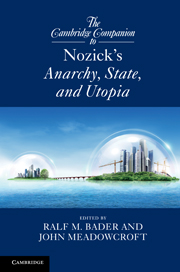4 - Nozickian arguments for the more-than-minimal state
from Part II - Anarchy
Published online by Cambridge University Press: 28 September 2011
Summary
INTRODUCTION
The first and longest part of Robert Nozick's Anarchy, State, and Utopia (ASU) is substantially devoted to a defense of the minimal (nightwatchman) state against the challenge of the individualist anarchist. In this chapter I explore the contest between Nozick and the individualist anarchist by examining responses that Nozick offered, could have offered, or should have offered to the anarchist challenge. I conclude that the best Nozickian response to the anarchist challenge vindicates a state which is more than minimal because, although it provides only the service of rights protection, it funds the production of its services by requiring at least some of the recipients of those services to purchase those services. In this introductory section I will provide a sketch of the structure of this exploration.
Nozick begins ASU with the well-known proclamation that “[i]ndividuals have rights, and there are things no person or group may do to them (without violating their rights)” (p. ix). He immediately adds: “So strong and far-reaching are these rights that they raise the question of what, if anything, the state and its officials may do. How much room do individual rights leave for the state?” (p. ix). Pursuing these questions, the individualist anarchist maintains with considerable plausibility that, if one takes these individual rights as seriously as Nozick thinks one should, one must reject even the minimal state in favor of a system of competing private protective agencies.
- Type
- Chapter
- Information
- Publisher: Cambridge University PressPrint publication year: 2011
- 23
- Cited by



